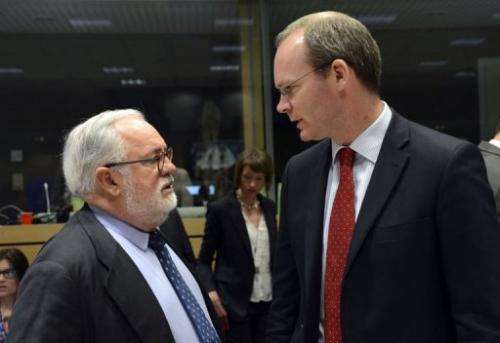Irish Minister for Agriculture, Food and the Marine Simon Coveney (R) talks to Spain's Minister for Agriculture Miguel Arias Canete prior to the start of the Agriculture and Fisheries Council meeting held at the European Union Council building in Brussels, on May 13, 2013.
EU fisheries ministers began difficult talks Monday on reforms to the bloc's under-pressure fishing regime, with plans to stop the dumping of unwanted fish a key sticking point.
European fishing boats have long discarded fish, by some estimates up to a quarter of their catch, before entering port to ensure they meet strict EU quotas.
Ireland, which holds the rotating EU presidency, is pushing for a compromise between northern member states ready to ban the practice and their southern counterparts anxious to preserve their fishing industries.
"We have very serious work to do over the next two days," said Irish Agriculture and Fisheries Minister Simon Coveney.
"Hopefully colleagues will work with me ... so that we can bring the Common Fisheries Policy reform to a final decision very soon," Coveney said.
"The talks will be really tough," an EU source said, noting that while all sides agree on the need for change given the strains on fish stocks, how to do that was hugely problematic.
In February, the European Parliament approved a total ban on fish discards from next year but this ran into strong opposition, from Spain especially.
Coveney subsequently worked out a compromise based on the principle that in future all fish caught must be brought to land.
However, in the first two years of the new policy, fishermen would have the right to discard up to 9.0 percent of their catch overboard, falling to 8.0 percent for the next two years and then finally to 7.0 percent.
Environmentalists said this provision undermined the whole reform effort while supporters argued that the fishing industry needed this flexibility so as to manage the catch effectively.
There are also divisions over when the industry should be put on a Maximum Sustainable Yield basis, a regime meant to ensure an adequate breeding stock remains. The European Parliament wants 2015 while opponents say this is much too early and would require too radical a change for fishermen.
"You have to take into account the economic and social problems that drastic measures could involve," Spanish Agriculture and Fisheries Minister Miguel Arias Canete Monday.
EU Fisheries Commissioner Maria Damanaki called on all sides to compromise for the sake a historic deal that would "put fish stocks on the road to recovery (and) ... eliminate the wasteful practice of discarding."
"It is the responsibility of all institutions not to jeopardise a final deal because of disagreements over a few percentage points, one or two years, detailed technical rules or institutional power struggle," Damanaki said.
"It is now time for both (parliament and member states) to make that extra final step towards each other that is necessary to come to a final agreement," she added.
The talks are due to conclude Tuesday but could last longer.
Some 47 percent of fish stocks in the Atlantic and 80 percent in the Mediterranean are believed to be overfished.
© 2013 AFP
























